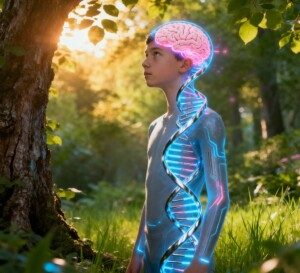If autism is an evolutionary trait only in humans, then wouldn’t this point to some sort of survival advantage?
Something doesn’t evolve unless it has a survival advantage.
Some survival advantages of evolution are obvious such as running speed, wings, big razor sharp teeth and a nose so keen it can detect a drop of blood in a football field of water.
Can Autism Spectrum Disorder – at least the form that’s called “low support needs” – be the product of evolutionary selection for a survival advantage?
I’m autistic, and before I proceed on to the science behind all of this, I just want to point out that if I and my neurotypical sisters were dropped in the middle of a jungle, there’d be only one still alive after a few days. Hint: The survivor has special interests and detests clothing tags!
A study in Molecular Biology and Evolution, published by Oxford University Press (2025), provides a possible reason as to why autism seems to show up so often in humans compared to other animals.
According to the paper, the answer may lie in how our brains evolved.
Globally, the World Health Organization puts the incidence rate of autism to around one in 100 (1%).
From an evolutionary perspective, autism — along with conditions like schizophrenia — looks like it might be something uniquely human – even though there’s probably people who swear that their cat is autistic.
You don’t really see signs of autism in other primates or other animals of high intelligence such as dogs, elephants and seals.
How the Research Was Done
The big breakthrough in this research comes from single-cell RNA sequencing, which lets scientists zoom in on individual brain cells and see exactly what’s going on.
Over time, researchers have discovered that the mammalian brain is full of an almost overwhelming variety of neuron types.
But here’s the kicker: Many of the genetic changes in the human brain are completely unique to us.
They’re bits of DNA that stayed pretty stable in other mammals but suddenly sped up in humans.
The researchers compared brain data from humans, chimpanzees and other mammals.
What they found is that a specific type of neuron in the brain’s outer layer, called L2/3 IT neurons, evolved way faster in humans than in apes.
And interestingly, many of the genes tied to autism show big changes in this process.
The researchers propose that many of these genes are tied to developmental delays.
In humans, slower brain development after birth may have allowed for more flexibility and learning time compared to chimps.
That extended childhood could have helped us develop advanced skills, especially language, which is often affected in autism and schizophrenia.
In short, autism may partly be a side effect of what makes us human.
Thinking Outside the Box and Attention to Detail: Advantages to Survival

The study suggests these autism-linked genes were shaped by natural selection in humans — meaning, they probably gave our ancestors some sort of survival advantage, even if we’re not exactly sure what that was.
As an Autist, I surmise that one of the survival advantages of autism during the Stone Age would’ve been the ability to think outside the box and our iconic eye for detail or detecting deviations.
Somewhere along the way, autism traits had appeared in the human gene pool to fuel the process of survival.
This meant crucial skills in a harsh environment where survival was always on a human’s mind – humans, with their inferior sense of smell, lousy night vision, slow running speed and small mouth with a feeble bite force when compared to other animals. And oh, lack of claws didn’t help, either.
The human brain and opposable thumb compensated, with their ability to construct spears: projectile weapons that put humans at the top of the food chain.
You might be wondering: If autism is the product of natural selection, why wasn’t or isn’t a much higher percentage of the human populace autistic?
Could be because for a species to be successful at survival, only a small percentage of genetic deviation is necessary to possess a distinct, genetically driven survival advantage that can carry the species as a whole.
It’s also possible that during the prehistoric era, autism was much more prevalent.

A brain that finds this type of disarray difficult to look at would be the same kind of brain that quickly devises a solution — based on organization — to a problem that involves randomness or disorder. Such orderly thinking was crucial in a harsh prehistoric environment.
Survival Advantage During Caveman Times vs. Modern Times
A fair question is if autism helped the human species survive, why is there a such thing as severe and especially profound autism, or autism otherwise characterized by high support needs, rendering the individual dependent on lifelong support?
Nobody knows if high support needs autism existed during primitive times. Perhaps only the “Aspie” or Level 1 type existed.
And somewhere along the way, random mutations led to more severe forms.
These genes for high support needs remained in the gene pool because humans were advanced enough to care for these individuals.
In lower animals, you can easily imagine a severely autistic member of a herd being left behind to fend for itself – becoming easy prey for predators.
Even a predator itself, if severely impacted by a differently-wired brain, could struggle with survival.
So it’s quite possible that the autism in our ancient ancestors would’ve been what we today call minimal support needs, Level 1 or high functioning.
One autistic person in an online forum says:
“We built this world for neurotypicals, but because neurotypicals are the majority, they control it.”
Another point to consider is that during prehistoric times, a Level 1 form of autism may not have been as much of a social hindrance.
Office politics didn’t exist back then! Social norms weren’t as complex in a primitive society, in which how to survive through to the next day was the top priority.
What’s the top priority today for many adults? Making sure their clothes and hair are “in style.” We don’t have to worry about survival; it’s literally there at the tap of a button.
Summary
The same genetic changes that gave us the ability to talk, think abstractly and develop culture may have also increased neurodiversity.
We’ll never know to what extent the autistic brain was responsible for groundbreaking inventions during ancient times, right down to the spear tip.
But certainly, there had to be some sort of survival advantage to neurodiversity.
As lead study author Alexander L. Starr put it: “Some of the same genetic changes that make the human brain unique also made humans more neurodiverse.”










































